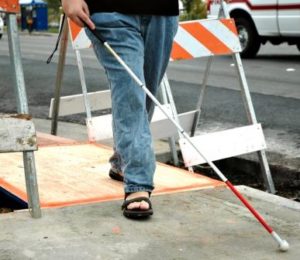
Surveys regularly reveal that, when asked about their greatest fear, people nominate blindness as one of the two things they dread most (cancer being the other).
And yet, the “disability weighting” – a measure of the severity of a disease on a scale from 0 (perfect health) to 1 (equivalent to death) – which appears in the World Health Organisation’s most recent Global Burden of Disease (GBD) register puts blindness (0.195) at less than the pain of the neck (0.221).
Flinders University’s Head of Optometry and Vision Science, Professor Konrad Pesudovs, together with Professor Hugh Taylor from the University of Melbourne and a group of international colleagues, are leading a campaign to have the weighting reassessed.
They have taken their fight to one of the world’s leading medical journals, The Lancet.
Professor Taylor, who is Harold Mitchell Chair of Indigenous Eye Health, told Flinders Indaily on a recent visit to Flinders that the weighting “didn’t pass the common sense test”.
“The impact of blindness is much more than rheumatoid arthritis (0.292) or having a binge drink once a month (0.259). It doesn’t stand to reason with anything we’ve know from the past or what we feel ourselves,” Professor Taylor said.
While likening the efforts of the many hundreds of researchers around the world who contributed to the GBD to “putting man on the moon”, Professor Taylor and his colleagues believe the questions put to survey participants need to be further validated.
“We would like to see some further studies done to try to test the wording of those different questions to see how susceptible the method is to the questions that were asked,” he said.
“In the past, people have calculated weights for disability by asking doctors or experts about how they think different diseases affect different people; the next method was to ask focus groups of patients. This time, the researchers just went out to people in the street.
“I’m not questioning the integrity of the researchers or the way the research was done, because both are outstanding. But I think the little building blocks might need a bit more work.”


By the same token, most people without a major physical disability would (and do) declare that they would rather be dead than be a wheelchair user. Yet many wheelchair users see being in a wheelchair as just part of life – inconvenient on occasions, definitely; but a major tragedy or even worse than being dead, possibly not. Often the burden of disability is not the disability itself, but the attitudes of other people to disability, and environments, policies and practices that are unaccommodating of disability